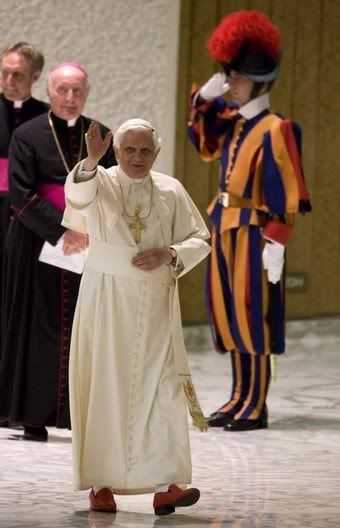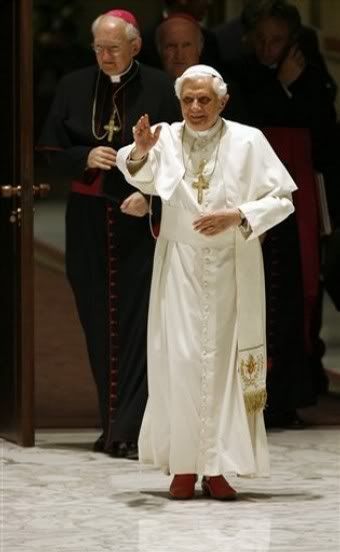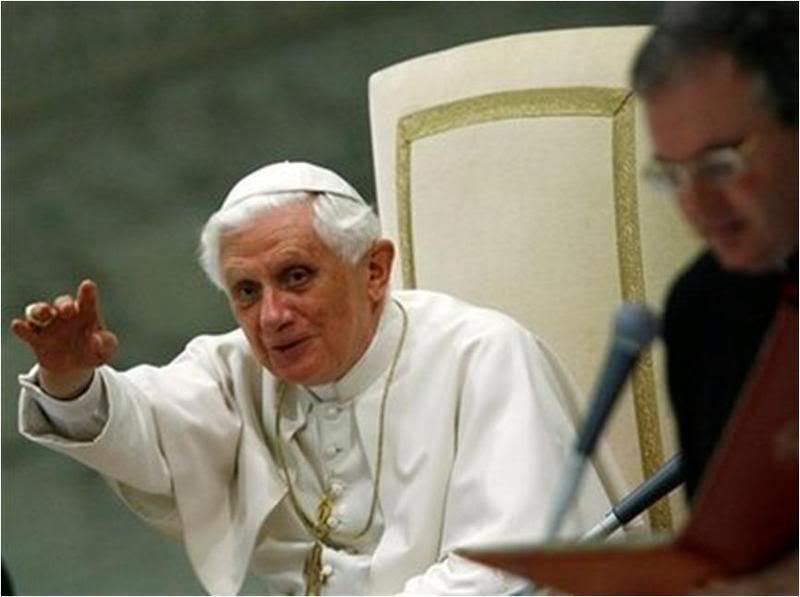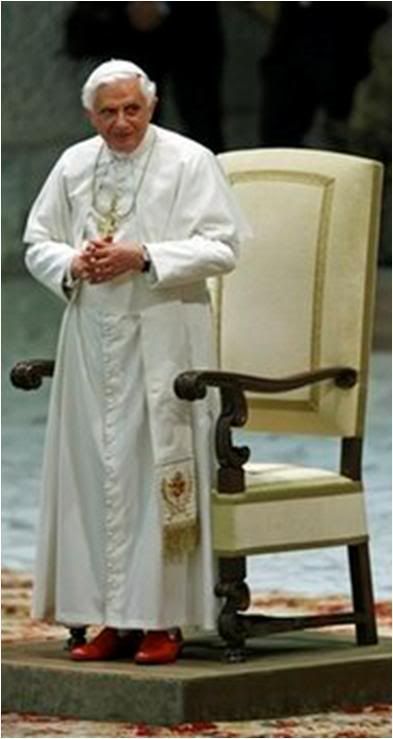 Well it is Wednesday so that means POPE BENEDICT Papal Audience time!!! Thanks to the Ratzinger forum for the quick translation and the pics. Pope Beendict is talking about St Paul and a very good meditation on St Paul's "Road to Damascus" event
Well it is Wednesday so that means POPE BENEDICT Papal Audience time!!! Thanks to the Ratzinger forum for the quick translation and the pics. Pope Beendict is talking about St Paul and a very good meditation on St Paul's "Road to Damascus" event AUDIENCE OF 9/3/08 Aula Paolo VI Here is a translation of the Holy Father's catechesis at the General Audience today, continuing his catechetical cycle on St. Paul. CATECHESIS #3
AUDIENCE OF 9/3/08 Aula Paolo VI Here is a translation of the Holy Father's catechesis at the General Audience today, continuing his catechetical cycle on St. Paul. CATECHESIS #3
The catechesis today will be dedicated to the experience that St. Paul had on the road to Damascus, that which is commonly called his conversion. It was on the road to Damascus, in the early years of the third decade of the first century, and after a time during which he had persecuted the Church, that the decisive moment came in Paul's life. Much has been written about this and of course, from different points of view.
What is sure is that what took place there was a turning point, or more properly, a complete reversal of perspective. From then on, unexpectedly, Paul started to consider as 'loss' and 'rubbish' all that had previously constituted for him the maximum ideal, almost the very reason for his being (cfr Phm, 3,7-8). What had happened? For this, we have two types of sources. The first type, and best known, are the accounts written by Luke, who three times narrates the event in the Acts of the Apostles (cfr 9,1-19; 22,3-21; 26,4-23).
The average reader may perhaps be tempted to linger too much on some details, such as the light from heaven, Paul collapsing to the ground, the voice that spoke, his sudden blindness, its subsequent healing by scales falling from his eyes and his fasting. But all these details all point back to the center of the event: the resurrected Christ appeared like a resplendent light and spoke to Saul, transforming his thinking and his very life.
The splendor of the Risen Lord blinded him: what appears externally is what happens in his interior reality, blinded in the face of truth, of the light which Christ is. Thereafter, his definitive Yes to Christ in baptism opens his eyes anew, makes him truly see again. In the early Church, Baptism was also called 'illumination', because this sacrament gives light, makes us truly see. What is thus indicated theologically is physically realized in Paul: the healing of his interior blindness. St. Paul was as therefore transformed not by a thought but by an event, by the irresistible presence of the Risen Lord, of which he could never again doubt, so strong was the evidence of the event, of that encounter.
It fundamentally changed the life of Paul - and in this sense, one can and must speak of a conversion. This encounter is the center of St. Luke's narrative, who probably used an account born in the (Christian) community of Damascus, given the local color of the presence of Ananias, the name of the street where Paul first stayed and the name of the owner of the house (cfr Acts 9,11).
The second type of source on this conversion are the Letters of St. Paul himself. He never spoke in detail about the event - perhaps because he thought everyone was aware of the essentials of the story, that everyone knew he was the persecutor transformed into a fervent apostle of Christ. This did not happen as a consequence of his own reflection , but to a powerful event, an actual encounter with the Risen Lord.
Even without speaking in detail, he referred several times to these most important fact, that even he was a witness to the resurrection of Jesus, which revelation he received from Jesus himself along with the mission to be his apostle. The clearest statement on this point comes in his account of what constitutes the center of the history of salvation: the death and resurrection of Jesus and his apparitions to witnesses (cfr. 1 Cor 15). Using words from the oldest tradition, as he received them from the Church of Jerusalem, he says that Jesus - who had died on the Cross, was buried and resurrected - appeared after the Resurrection, first to Cephas, that is, Peter; then to the Twelve, then to 500 brothers , most of whom were still alive in Paul's time; then to James, then to all the Apostles.
To this traditional account , he added: "Last of all, he appeared to me" (1 Cor 15,8). thus he makes it understood that it was the foundation of his apostolate and his new life. There are other passages in which he says the same things: "Through Jesus, we received the grace of Apostolate" (cfr Rm 1,5); and "Have I not myself seen Jesus, our Lord?" (1 Cor 9,1), words which which he referred to something everyone knew. Finally, the most widely known passage is found in Galatians 1, 15-17: "But when (God), who from my mother's womb had set me apart and called me through his grace, was pleased to reveal his Son to me, so that I might proclaim him to the Gentiles, I did not immediately consult flesh and blood, nor did I go up to Jerusalem to those who were apostles before me; rather, I went into Arabia and then returned to Damascus". In this 'auto-apologia' (self-explanation), he underscores definitively that even he was a true witness of the Risen Lord, that he had received his own mission directly from the Risen Lord.
Thus we can see that both sources - the Acts of the Apostles and the Letters of St. Paul - converge and agree on the fundamental point: the Risen Christ spoke to Paul, he called him to the apostolate, he made him a true Apostle, witness of the resurrection, with the specific task of announcing the Gospel to the pagans, to the Greco-Roman world. At the same time, Paul also learned that despite the immediacy of his experience with the Risen Lord, he had to enter into the communion of the Church, he should be baptized, he should live in tune with the other apostles. Only in communion with everyone could he be a true apostle, as he writes explicitly in the first letter to the Corinthians: "Therefore, whether it be I or they, so we preach and so you believed" (15,11).
There is only one announcement to be made, before Christ is one alone. As we can see, in all these passages, Paul never interprets the event as a fact of conversion. Why? There are so many hypotheses, but for me, the reason is very evident. This turning-point in his life, the transformation of all his being, was not the fruit of a psychological process, of an intellectual and moral maturation or evolution, but something that came from without: it was not the fruit of his thinking, but of the encounter with Christ Jesus.
In this sense, it was not simply a conversion, a maturation of his 'I', but it was his own death and resurrection - one existence died, and another was born with the Risen Christ. Paul's renewal cannot be explained any other way. Not all the psychological analyses can clarify and resolve the question. Only the event itself, that powerful encounter with Christ, is the key for understanding what happened: death and resurrection, a renewal by the very one who had appeared and spoken to him. In this more profound sense then yes, we can and should speak of conversion. This encounter was a real renewal which changed all his parameters.
Thus he could say that what had once been essential and fundamental for him had become 'rubbish', no longer a 'gain' but a loss, because from then on, only the life of Christ mattered. Nonetheless, we should not think that Paul was then trapped or enclosed by that one event. The contrary is true, since the Risen Christ is the light of truth, the light of God himself. This opened up his heart, made it open to all. At that moment, he did not lose what there was of goodness and truth in his life, his his heredity, but he understood in a new way the wisdom the truth and the profundity of the Laws and the Prophets, he re-appropriated them in a new way.
At the same time, his reason opened up to the wisdom of the pagans: being open to Christ with all his heart, he became capable of an ample dialog with everyone, he became capable of doing everything for everyone. Thus he could truly be an apostle of the pagans. As for us, we ask what can all this mean for us? It means that even for us, Christianity is not a new philosophy or a new morality. 
We are Christians only if we encounter Christ. Of course, he does not show himself to us irresistibly, luminously, as he did to Paul, to make him the apostle for all Gentiles. But even we can encounter Christ, in reading Sacred Scripture, in prayer, in the liturgical life of the Church. We can touch the heart of Christ and feel that he touches ours. Only in this personal relationship with Christ, only in this encounter with the Risen Lord, do we truly become Christians. In this way, our mind opens up to all the wisdom of Christ and the richness of truth. Let us therefore pray to the Lord that he may illumine us, that he gives our world this meeting with his presence, and thus grant us a living faith, an open heart, great charity for all, able to renew the world.
In English, he said:
Dear Brothers and Sisters,
Today’s catechesis focuses on Saint Paul’s conversion. In the Acts of the Apostles, Saint Luke recounts for us the dramatic episode on the road to Damascus which transformed Paul from a fierce persecutor of the Church into a zealous evangelizer. In his own letters, Paul describes his experience not so much in terms of a conversion, but as a call to apostleship and a commission to preach the Gospel. In the first instance, this was an encounter not with concepts or ideas but with the person of Jesus himself.
In fact, Paul met not only the historical Jesus of the past, but the living Christ who revealed himself as the one Saviour and Lord. Similarly, the ultimate source of our own conversion lies neither in esoteric philosophical theories nor abstract moral codes, but in Christ and his Gospel. He alone defines our identity as Christians, since in him we discover the ultimate meaning of our lives. Paul, because Christ had made him his own (cf. Phil 3:12), could not help but preach the Good News he had received (cf. 1 Cor 9:16). So it is with us. Transfixed by the greatness of our Saviour, we – like Saint Paul – cannot help but speak of him to others.
May we always do so with joyful conviction! I welcome all the English-speaking visitors present at today’s Audience including the Missionary Sisters Servants of the Holy Spirit and a group of Maltese altar boys currently serving in Saint Peter’s Basilica. May your visit to Rome strengthen your commitment to share the Good News of Jesus Christ. Upon all of you, I invoke God’s abundant blessings of joy and peace.
Wednesday, September 3, 2008
Pope Benedict Talks About St Paul's Road to Damascus Experience at Wednesday Audience (Full Text)
Posted by
James H
at
9/03/2008 01:03:00 PM
![]()
Labels: Pauline Year, Pope Benedict, vatican
Subscribe to:
Post Comments (Atom)















2 comments:
Isn't it such a coincidence, the Reps are in St. Paul and we are in a year of Pauline celebration...
LOL that is true. I never thought of that.
Post a Comment